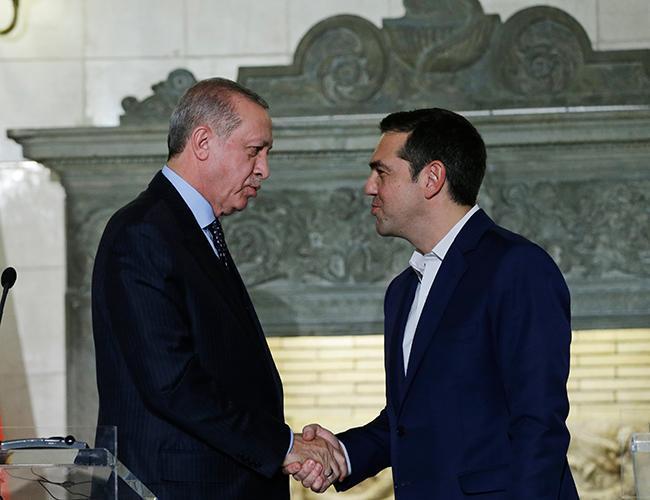
Turkish President Tayyip Erdoğan on Dec. 7 said during an official visit to Greece that “some details” in the Treaty of Lausanne, which established the borders of the Republic of Turkey with its neighbors, were “unclear.”
Speaking in Athens at a joint news conference with Greek Prime Minister Alexis Tsipras - the first visit by a Turkish president to Greece in 65 years - Erdoğan suggested that the 1923 Treaty of Lausanne was not being applied fairly.
He said protecting the rights of ethnic Turks within Greece’s borders was a priority for Turkey and called for an improvement to the ethnic status of Turks living in the country.
“I demanded [from Tsipras during the meeting] that improvements should be made regarding the situation of the Muslim minority. It is the Greek government’s responsibility to protect the legal rights of the Muslims in Western Thrace,” he said. But Tsipras said a revision to the Treaty of Lausanne was “out of the question.”
The 1923 Treaty of Lausanne guarantees the religious freedoms of the Muslim minority in Greece.
Ahead of his meeting with Tsipras, Erdoğan held a meeting with Greek President Prokopis Pavlopoulos in Athens during which he said Muslims in the Greek border region of Western Thrace were not able to choose their own chief mufti, while Christian communities in Turkey enjoyed greater freedom when choosing their patriarchs.
“How can we say Lausanne is in effect? Lausanne is not in effect. We need to prove Lausanne’s applicability by doing this,” Erdoğan said.
Pavlopoulos, however, like Tsipras ruled out any revision of the Treaty of Lausanne.
“The Treaty of Lausanne defines the territory and the sovereignty of Greece and of the European Union and this treaty is for us non-negotiable. It has no flaws, it does not need to be reviewed, or to be updated,” Pavlopoulos said during the meeting.
Erdoğan said there was a state “discrimination” against the Turkish minority in the Western Thrace, which is home to around 145,000 Muslim Turks.
He also noted that the national income in Greece is around $18,000, while the average in Western Thrace is only around $2,200.
The Greek state “doesn’t give the necessary support for investments” in the region, Erdoğan said.
In a tense back and forth between the two leaders, Erdoğan also said Greece “could not have entered the NATO without Turkey’s support.”
The Turkish president also touched on the divided island of Cyprus. “Our aim is to find a permanent and fair solution on Cyprus, and find the same in the Aegean,” he said.
Cyprus was divided into a Turkish Cypriot state in the north and a Greek Cypriot administration in the south after an Enosis (Union)-inspired 1974 coup was followed by Turkey’s military intervention as a guarantor power. The status of the island remains unresolved despite of a series of discussions that resumed in May 2015.
Following the joint news conference with Pavlopoulous, Erdoğan met Greek Prime Minister Alexis Tsipras.
“We, as Turkey, don’t have an eye on the territorial integrity of any neighboring country,” Erdoğan told reporters ahead of his closed-door meeting with Tsipras, without naming any country.
“I have also said this in the meeting that I conducted with the honored President [Pavlopoulous]: As of now, Turkey and Greece should no longer see the glass as half empty but rather look at the full side. We should base our negotiations on [such an understanding]. There are many common traits between our people, as long as we put aside those who have ideological obsessions … We are countries that have lived in each other’s pockets in the past. If we can establish a common discourse and wisdom, we can get rid of our problems,” he said.
For his part, Tsipras said Greece puts its effort on “building bridges and not walls” between the countries to overcome problems.
“We should focus on common ground rather than disputes between us,” Tsipras said.
Erdoğan arrived in Athens on Dec. 7 on a two-day official visit, with Greece hoping the trip will help improve often frosty ties with its neighbor and NATO ally.
The Turkish president was greeted by an honor guard at the airport and headed to central Athens, laying a wreath at the Tomb of the Unknown Soldier before talks with Tsipras and other officials. On Dec. 8, he will to northeastern Greece to meet with members of the country’s Muslim minority.
Security was reported to be tight in the Greek capital, with roads shut down and demonstrations banned in the center of Athens.